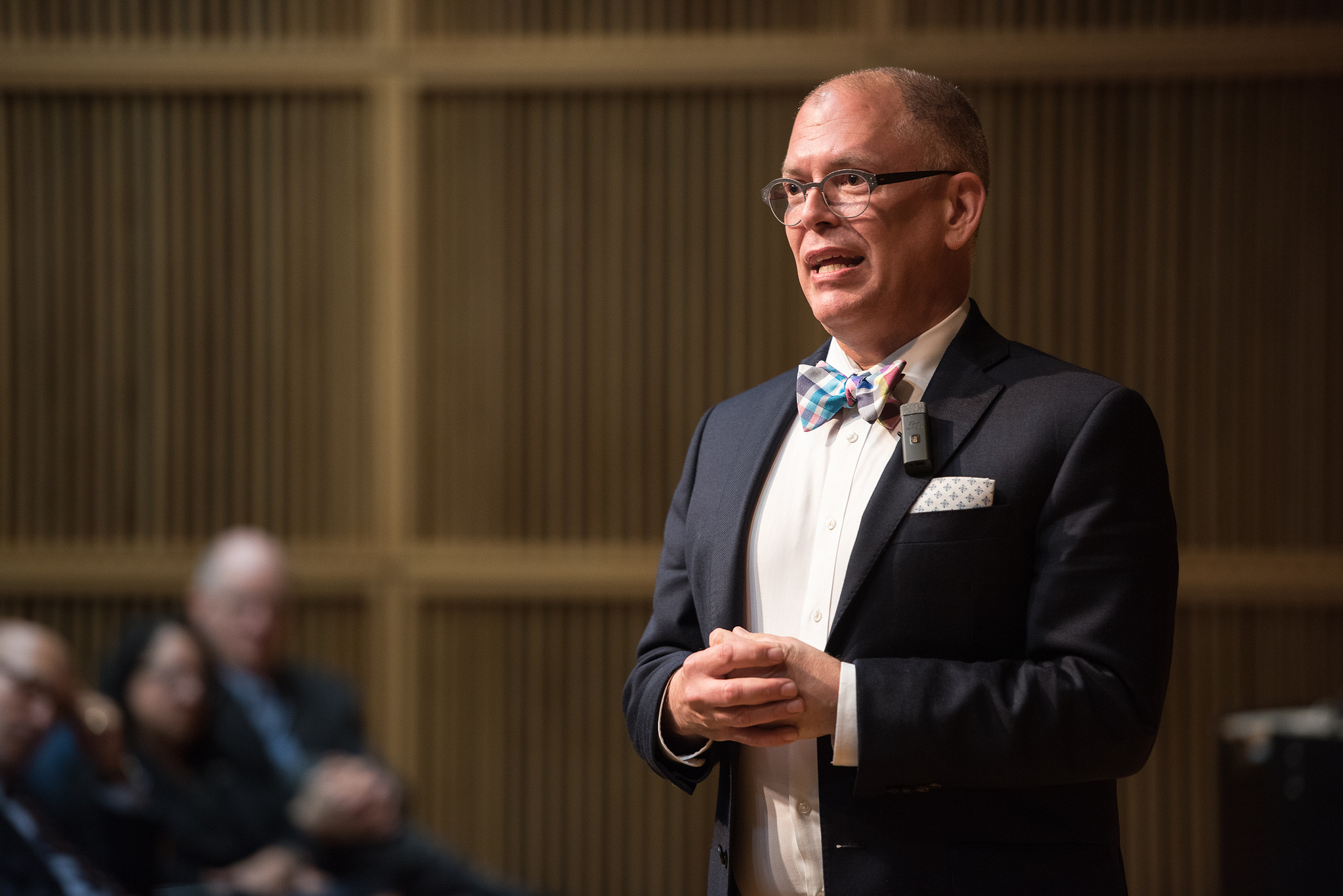Published on
Jim Obergefell’s love endured through his partner’s death and all the way to the Supreme Court.
 Jim Obergefell speaks about winning the landmark Supreme Court case that granted equal marraige rights to same-sex couples. Obergefell received a standing ovation after his lecture.
Jim Obergefell speaks about winning the landmark Supreme Court case that granted equal marraige rights to same-sex couples. Obergefell received a standing ovation after his lecture.
Photo by Eleanor Hasenbeck | Bond Life Sciences
By Eleanor C. Hasenbeck | Bond Life Sciences
Jim Obergefell had a destination wedding, but not by choice. On a chartered medical jet on a tarmac in Baltimore, Obergefell married John Arthur, his partner of 20 years, in a union that would result in a landmark Supreme Court decision.
Obergefell was the named plaintiff in the landmark decision that granted same-sex couples the right to marry, Obergefell v. Hodges. He closed the Life Sciences and Society Symposium, The Science of Love, Friday, October 13, with a lecture and book signing.
Obergefell and his partner John met and began their life together in Cincinnati, Ohio, around the time the city passed an ordinance prohibiting any city laws that would protect LGBTQ people. In 2004, Ohio passed a state Defense of Marriage Act that explicitly prohibited marriage between same-sex couples in Ohio. In 2013, the Supreme Court handed down the Windsor decision, which struck down a key portion of the federal Defense of Marriage Act and gave same-sex marriages federal recognition.
When Obergefell learned this news, he leaned over, hugged and kissed his partner, and said “let’s get married.”
This was more complicated than your run-of-the-mill, spontaneous wedding. Due to marriage prohibitions in Ohio, the couple had to get a dying man to a state that would marry same-sex couples. Jim’s partner, John Arthur, suffered from Amyotrophic Lateral Sclerosis, Lou Gehrig’s disease. ALS is a degenerative disease of the nervous system. Nerves that control voluntary movements like breathing, walking and chewing deteriorate and die. A dead nerve cell cannot send pulses to the muscles, so a person with ALS will gradually lose all ability to move, talk and breathe. Arthur was entering the later stages of the disease, and he was confined to a wheelchair with little ability to move.
They settled on Maryland, because it didn’t require both spouses be present to obtain a marriage license. Obergefell got the license, and the couple’ family and friends helped them charter a medical jet to fly to their wedding. Because of Arthur’s illness, they said their vows in the tiny plane’s cabin on the tarmac, with the ceremony officiated by Arthur’s aunt.
That wasn’t the end of their love story. The following week, a human rights lawyer showed them a blank death certificate and told them when Arthur died, the state of Ohio wouldn’t recognize their marriage. Arthur would be listed as single, and in the eyes of their state government, Obergefell wouldn’t be his widow.
“I loved John,” Obergefell said. “I loved my husband, and I was willing to fight for that, and I was not willing to let my state, Ohio, tell me that I was not his widower. That wasn’t something that I was going to give up.”
Eight days after their wedding, Obergefell filed suit against the state of Ohio and the city of Cincinnati. Three months after the cases first hearing, Arthur died. Obergefell ordered 20 copies of his death certificate, knowing the state of Ohio wouldn’t get it right. The Sixth Circuit Court ruled against the couple, opening the case up for Supreme Court review.
It took two years from their wedding, but the Supreme Court ruled in their favor and granted equal marriage rights to same-sex couples on July 26, 2015. Obergefell left the courtroom to a crowd of cheers, cries, high-fives and slaps on the back. He received a phone call from President Barack Obama. He only remembered what he said after watching himself speak to the President on CNN News.
Today, he calls himself an “accidental activist.” He tells his story at speaking events across the country. He said he feels proud each time an audience member tells him he’s given them the bravery to come out to their friends and family. 20th Century Fox bought the movie rights to his book, Love Wins, and he’s starting a business selling LGBTQ-themed wines, with a portion of the proceeds benefitting organizations advancing LGBTQ equality.
As he spoke, it marked four years since his husband’s passing. Now ordained himself, he married two of his friends, a same-sex couple, earlier this week. For him, the Supreme Court’s decision marks his partner’s greatest legacy.
“You know, I’d give it all back for John to be here,” Obergefell said. “I couldn’t prevent John from dying of ALS, but I’m really happy I could help create a legacy of love for millions of people in his memory.”
Obergefell spoke as part of the The 13th annual Life Sciences and Society Symposium, The Science of Love, Oct. 6-13, 2017. It featured six experts that research various aspects of love, relationships and connection. Obergefell’s book, Love Wins, is available now.